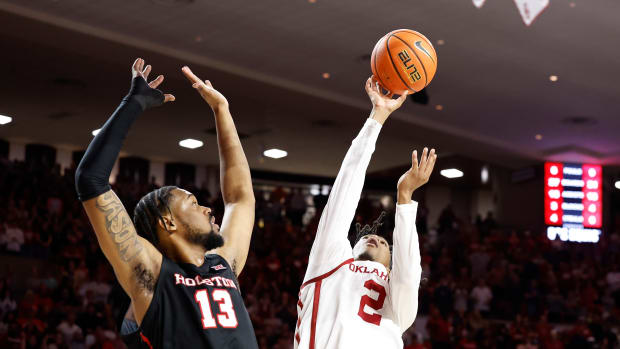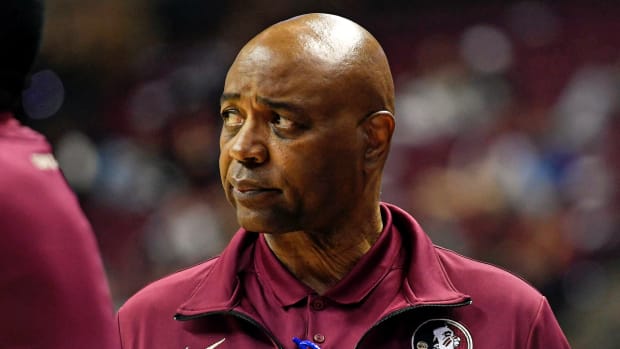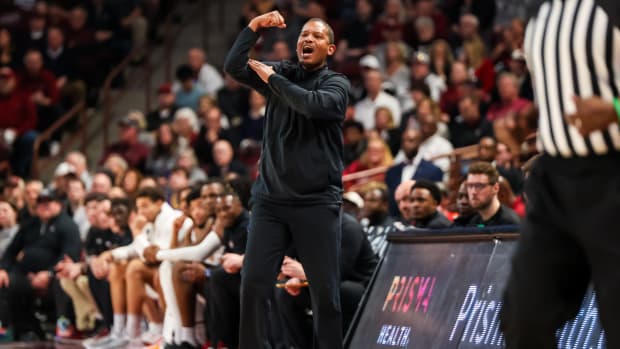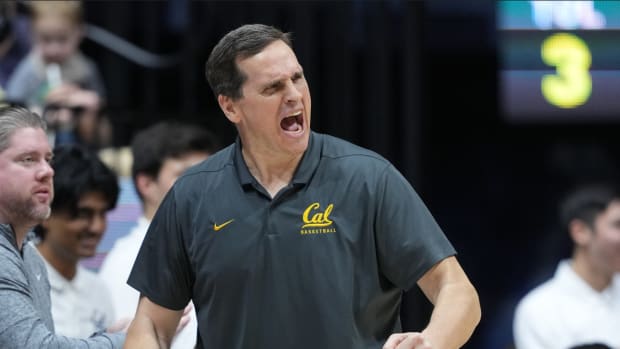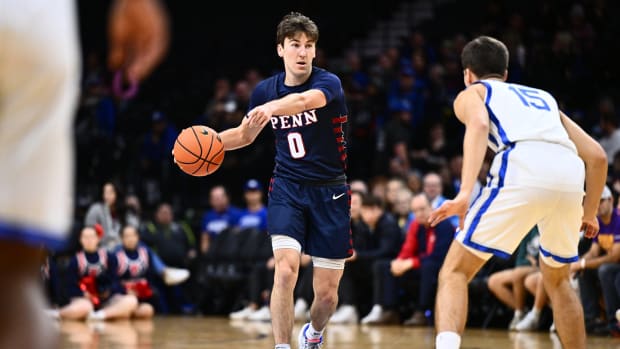The Stakes Are High for Belmont, Quality Mid-Majors Ahead of Conference Tournaments
Casey Alexander was calling from the opulent confines of the Holiday Inn Express in Richmond, Ky.—your classic, just-off-the-interstate, next-to-the-chain-restaurant lodging that comes with the Ohio Valley Conference territory. This is a bus-ride league, the basketball season built on two-game road swings through mid-sized towns in five states.
The road trips can be fun. But they aren’t easy or glamorous.
Alexander’s Belmont Bruins were between games last Friday—Eastern Kentucky the night before, Morehead State the following night—and they were hurting after an 81–67 defeat at the hands of the Colonels. It was their first loss since Dec. 5, snapping a 21-game winning streak. But it came with a sizable excuse: The Bruins’ leading scorer and low-post offensive and defensive anchor, 6’11” Nick Muszynski, had missed the game with a foot injury.
Not everyone around the sport checked the box score and knew about the injury. So the immediate reaction in some circles was that Belmont had given away its thin margin of error in terms of an NCAA tournament at-large bid. In the tyranny of a tournament that caters to the multi-bid power conferences, Alexander knows well the penalty mid-major programs pay for any losses.
“It’s difficult,” he said of the burden to be nearly perfect. “But honestly, I don’t know how much our players even think about that. I don’t think they felt that. I never felt like there was any pressure, including in [Thursday] night’s game.”
A day later and 67 miles to the northeast, the Bruins lost to Morehead in overtime—again without Muszynski, and again not many noticed or cared about that extenuating circumstance. In the court of public opinion, Belmont was moved into the category OVC teams chronically reside in: automatic bid or bust.
The losses did not come against bums. Morehead finished the regular season 20–7 and earned the No. 2 seed for the OVC tournament. Eastern Kentucky finished 21–6, earning the third seed. Belmont beat them both earlier in February by double digits. And, again, the Bruins were down a key part in the rematch games—maybe their most key part.
Nevertheless, human voters all but abandoned Belmont as a Top 25 option: The Bruins went from being 27th with 80 points in the AP poll to 37th with five points; and from 29th with 45 points in the coaches poll to 37th with 11 points. Computer ratings also tumbled: from No. 75 nationally before the road trip to No. 87 in Ken Pomeroy’s metrics; from No. 79 to No. 93 in Bart Torvik’s. In mock brackets across the land, Belmont was primarily regarded as a No. 13 seed—which is to say, off the bubble.
This is the annual plight of the quality mid-major programs. Scheduling is hard, losses are punitive, March becomes must-win. Drake (24–3) knows the feeling this year. So does Winthrop (20–1).
Meanwhile, membership in the power conferences has its privileges. Seton Hall (13–10) of the Big East also had an 0–2 week against a pair of non-tournament teams, Georgetown and Butler, but the Pirates are in many mock brackets and just out in most others. Indiana (12–12) has lost three straight heading into a game at Michigan State on Tuesday night, but still is considered on the bubble. Syracuse, 2–7 on the road, is skulking around the bubble as well.
As of Tuesday, no team in America has more than Belmont’s 24 wins. Only six teams have fewer than its three losses. And yet it’s likely that the Bruins are like hundreds of other mid-major teams, heading into a conference tournament quarterfinal game Wednesday against SIU-Edwardsville thinking they need to win it all to go dancing.
Of course, the NCAA selection committee members may be viewing things completely differently than the mock bracketeers, whose word is not gospel. They certainly will factor Muszynski’s injury into their appraisal of Belmont—and the Bruins are expecting him to be available this week in Evansville. If they reach the OVC final and lose a well-played game against a team from the league’s upper echelon, they might still have a chance.
This happened in 2019, when Belmont was beaten in the championship game by Murray State and a kid named Ja Morant. Both teams got bids, and both won games in the NCAAs. But that Belmont team had what this team lacks—quality non-conference victories.
The 2019 Bruins beat UCLA and Western Kentucky, and won a pair against Nashville neighbor Lipscomb (which was coached by Casey Alexander). The current Bruins were scheduled to play in the Orlando multi-team event, which was going to include the likes of Gonzaga, Michigan State, Auburn, Saint Louis and Boise State. They also had games scheduled at USC, Western Kentucky and Duquesne.
All of that was wiped out by the pandemic. So Belmont was left with games against Howard, George Mason, Division II Queens University, Samford, Lipscomb, Kennesaw State and Evansville. The Bruins went 6–1 in those games, but the loss was costly—at home against a Samford team that was 5–3 in 2020 but 1–9 in 2021. That’s a Quad 4 loss that leaves a mark.
And still: Georgia Tech lost November games to Georgia State and Mercer, but finds itself right in the mix for an at-large bid. Being tied for sixth in the ACC is a much better position than winning the OVC when it comes to NCAA consideration.
Casey Alexander knows all this. He lived it at Lipscomb. That 2019 team that was swept by Belmont? It beat TCU, SMU, Vermont and finished the regular season 23–6. But the Bisons lost a tough ASUN final to Liberty and were snubbed by the NCAA selection committee. Liberty went on to win a game in the Big Dance and Lipscomb stormed to the NIT championship game before losing to Texas.
Did that Alexander-led team deserve a bid? Yes. Does this one? Quite likely. Will it get one without winning three games in Evansville? Unlikely.
I may be lamenting Belmont’s fate, but Alexander is not.
“It’s part of the madness of it,” he said. “I’d rather it be a case where we knew we are in, but whether you’re the No. 1 seed or the No. 8 seed, your backs are against the wall. To me, the beauty of athletics is in those moments.”

